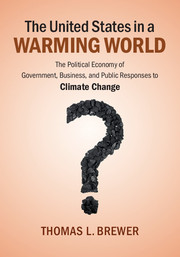 The United States in a Warming World
The United States in a Warming World Book contents
- Frontmatter
- Dedication
- Contents
- List of boxes
- List of figures
- List of tables
- List of maps
- Preface
- Acknowledgments
- Permissions
- Introduction: a chronological overview
- Part I Issues
- Part II Domestic economics and politics
- Part III National government policies
- Chapter 5 Regulating carbon dioxide and other greenhouse gases
- Chapter 6 Facilitating energy technology innovation and diffusion
- Chapter 7 Strengthening international cooperation
- Part IV The future
- References
- Index
Chapter 5 - Regulating carbon dioxide and other greenhouse gases
Published online by Cambridge University Press: 05 October 2014
- Frontmatter
- Dedication
- Contents
- List of boxes
- List of figures
- List of tables
- List of maps
- Preface
- Acknowledgments
- Permissions
- Introduction: a chronological overview
- Part I Issues
- Part II Domestic economics and politics
- Part III National government policies
- Chapter 5 Regulating carbon dioxide and other greenhouse gases
- Chapter 6 Facilitating energy technology innovation and diffusion
- Chapter 7 Strengthening international cooperation
- Part IV The future
- References
- Index
Summary
…[Y]ou will never have energy independence without pricing carbon.…The technology doesn’t make sense until you price carbon.
Senator Lindsey Graham (2010)A federal cap-and-trade program is perhaps the most significant endeavour undertaken by Congress in over 70 years….
Senator Debbie Stabenow and nine other senators (2009)This is the most complicated issue I have addressed in my [half century] in Congress.
Representative John Dingell (2008)This chapter addresses a variety of questions focused on congressional consideration of climate change legislation over a period of more than a decade: What killed the BTU tax in 1993 (Section 5.1), and what killed cap-and-trade legislation in 2010 (Section 5.2)? What were the patterns of voting behaviour in the House and the Senate when cap-and-trade legislation was considered? How much influence has business lobbying had on the outcomes of the effort to establish a national cap-and-trade system? How do institutional distortions of representation patterns affect the influence of carbon-intensive areas versus low-carbon areas? In Section 5.3, the questions concern the regulatory activities of the Environmental Protection Agency (EPA) and the Security and Exchange Commission (SEC): In the aftermath of the abandonment of cap-and-trade legislation in the Senate in 2010, what has been happening to EPA rules – and legal actions to oppose them? What has the SEC been doing about climate change issues?
The chapter builds on the analysis of business interests and lobbying activities in Chapter 2 by examining their role in the legislative process for specific bills in the House and Senate. It also compares congressional attitudes and actions with public perceptions of the problem and preferences for solutions in Chapter 3. It furthermore applies the patterns of economic and political geography in Chapter 4 to the issues of whether and how to develop a national mandatory cap-and-trade system.
- Type
- Chapter
- Information
- The United States in a Warming WorldThe Political Economy of Government, Business, and Public Responses to Climate Change, pp. 149 - 188Publisher: Cambridge University PressPrint publication year: 2014


